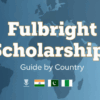
Master’s and PhD Fulbright applicants seeking positions in USA are strongly advised to consult their home country’s Fulbright scholarship guide before preparing their application. Each country operates its own nomination process, with differences in Fulbright eligibility criteria, selection procedures, and submission deadlines. By using the drop-down menu provided at the end of this page, applicants can access the official Fulbright scholarship guide relevant to their country of citizenship. These guides contain precise details, including required academic qualifications, English proficiency test score thresholds, and supporting documentation, as well as whether an exchange or commencing program is available. To illustrate how the process varies in practice, this article outlines the application steps specifically for Indian, Pakistani, and Nigerian students.
Fulbright Scholarship Guide India
How to Apply for Fulbright-Nehru Master’s Fellowships
The Fulbright-Nehru Master’s Fellowships are prestigious awards for Indian students who demonstrate leadership and a commitment to community service. Applicants must have the equivalent of a US bachelor’s degree with at least 55% marks, or a combination of a bachelor’s and master’s degree, and at least three years of relevant work experience. These fellowships support up to two years of study at US universities in select fields, including public health, sustainable development, journalism, international legal studies, and urban planning. According to the Fulbright scholarship guide, benefits include J-1 visa sponsorship, airfare, tuition coverage, living costs, and health insurance, though fellows may need to supplement costs.
Master’s applicants should carefully follow the online process, including submitting the FNMaster’s Annexure, Employer’s Endorsement Form (if applicable), and recommendation letters. Government of India employees are not eligible, and candidates must commit to returning to India after study. Placement is handled by the IIE, which applies to multiple universities on the candidate’s behalf, considering both preferences and competitiveness. As highlighted in the Fulbright scholarship guide, applicants may only apply for one fellowship category per cycle, and plagiarism or incomplete applications result in disqualification.
How to Apply for Fulbright-Nehru Doctoral Research Fellowships
The Fulbright-Nehru Doctoral Research Fellowships enable Indian PhD candidates to conduct six to nine months of research in the US. These fellowships strengthen long-term research collaboration and provide exposure to advanced resources and training. Applicants must be registered for a PhD at an Indian institution before November 1, 2024, with a thesis submission date at least three months after the fellowship ends. As detailed in the Fulbright scholarship guide, eligible fields include computer science, political science, psychology, performing arts, environmental science, and public health. Benefits include visa sponsorship, flight tickets, a monthly stipend, accident and sickness coverage, and modest affiliation fees, though dependents are not funded.
Applicants must submit an online package including transcripts, annexures, recommendation letters, and (if employed) employer endorsement. A published paper or master’s thesis extract (up to 20 pages) is also required. As emphasized in the Fulbright scholarship guide, plagiarism leads to disqualification, and late or incomplete applications are rejected. Placement is arranged by USIEF in coordination with US institutions and universities. By fostering innovation and global research collaboration, these fellowships prepare PhD students and graduates to address pressing challenges in India and beyond.
Fulbright Scholarship Guide Pakistan
Master’s Fulbright Scholarship Guide for Pakistani Students
The Fulbright Master’s Program provides funded master’s scholarships for Pakistani students to pursue graduate study in USA. Sponsored by the US Department of State, this program covers tuition, airfare, living stipends, textbooks, and health insurance, while USEFP supports students throughout the visa process. To be eligible, applicants must hold either a four-year bachelor’s degree or a combination of bachelor’s and master’s degrees totaling 16 years of formal education. Recent graduates are strongly encouraged to apply, though MBA and Public Policy/Administration applicants need two years of work experience. This Fulbright scholarship guide emphasizes that applicants from all disciplines, except clinical medicine, are welcome.
PhD Fulbright Scholarship Guide for Pakistani Students
The Fulbright PhD Program supports Pakistani students aiming to advance their research and academic careers in the US. Funded by the US Department of State, the program provides tuition, living expenses, airfare, health coverage, and visa assistance. Eligible candidates must hold a master’s, M.Phil., or equivalent degree (at least 18 years of education) from an accredited institution. Applicants with teaching, research, or public sector experience are especially encouraged to apply. According to the Fulbright scholarship guide, all fields of study are accepted except clinical medicine. Successful PhD recipients must also sign a bond requiring them to return to Pakistan and serve for a duration equal to their study period.
How to apply for Fulbright Scholarships in Pakistan
A complete application package includes:
- An application form
- Three reference letters
- GRE General score report. A minimum score of 145 is required on each section of the GRE examination, with a higher score on the section most applicable to your field of study.
- Scanned transcripts, including an explanation of the grading scale of the university issuing the degree should be uploaded. Please note that HEC-attested documents are preferable with the application but degree and transcripts attested by the issuing authority will be acceptable at the time of application.
Incomplete applications will not be considered. An application with references and required supporting documents must be submitted online. Please note that paper applications will not be accepted. Persons with a dual US/Pakistan nationality or those having a spouse, siblings, parent, or child over 18 years of age who is a US citizen or permanent resident cannot apply for Fulbright scholarships in the USA. Read through this guideline for more details, including ineligibility criteria.
PhD Fulbright Scholarship Guide Nigeria
The FFSP in Nigeria offers doctoral candidates a chance to enhance their research at US universities while strengthening academic capacity in Nigerian institutions. According to the Fulbright scholarship guide, the program is open only to PhD students who are at least two years into their doctoral studies. Grants provide round-trip airfare, settling-in allowance, monthly stipend, housing, book and computer allowances, and health insurance coverage through university plans and the Fulbright ASPE. Dependents are not funded. Eligible fields include science, engineering, agriculture, economics, journalism, public health, political science, and more. Students with disabilities are encouraged to apply, with tailored support available to assist them.
PhD Fulbright Eligibility and Requirements in Nigeria
Applicants in Nigeria must meet strict Fulbright eligibility requirements to be considered. They must be Nigerian citizens enrolled in a doctoral program, have strong academic records, and excellent English proficiency (TOEFL score >= 90). Only the TOEFL iBT test is acceptable to the FFSP in Nigeria. Applications require a detailed research proposal, CV, transcripts, three recommendation letters, and a TOEFL report. Candidates must demonstrate motivation, a commitment to return to Nigeria, and preference is given to those who have not studied in the US. The Fulbright scholarship guide stresses that plagiarism is grounds for disqualification, with all applications screened by software. Applications must be submitted online at the IIE portal by June 1, 2025.
Conclusion
The Fulbright Scholarship remains one of the most respected pathways for international students seeking advanced study or research opportunities in the United States. While the core mission of cultural exchange and academic excellence is consistent worldwide, each country’s Fulbright scholarship guide outlines its own rules, eligibility criteria, deadlines, and required documents. Understanding these local guidelines is essential for preparing a strong and compliant application. Whether you are applying from India, Pakistan, Nigeria, or any other participating country, early preparation, careful attention to details, and strict adherence to instructions will significantly improve your chances of success. Ultimately, Fulbright empowers students and researchers to grow, collaborate, and contribute globally.








Leave Your Comment